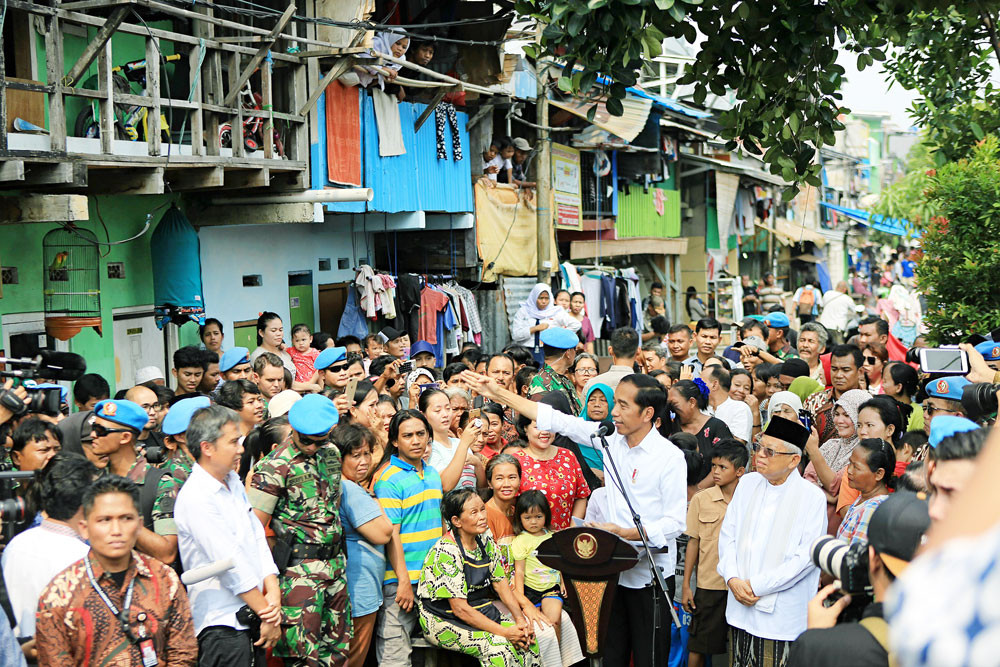Popular Reads
Top Results
Can't find what you're looking for?
View all search resultsPopular Reads
Top Results
Can't find what you're looking for?
View all search resultsIt's a wrap
But elections, just like history in general, are interested only with winners. The focus now is on Jokowi and what he will do in his second term.
Change text size
Gift Premium Articles
to Anyone
 Five more years: President-elect Joko “Jokowi” Widodo is accompanied by running mate Ma’ruf Amin as he delivers a victory speech to residents of Johar Baru in Central Jakarta on Tuesday. The General Elections Commission (KPU) declared late on Monday Jokowi and Ma’ruf winners of the 2019 presidential election with 55.5 percent of the vote, while challengers Prabowo Subianto and running mate Sandiaga Uno received 44.5 percent. (The Jakarta Post/Seto Wardhana )
Five more years: President-elect Joko “Jokowi” Widodo is accompanied by running mate Ma’ruf Amin as he delivers a victory speech to residents of Johar Baru in Central Jakarta on Tuesday. The General Elections Commission (KPU) declared late on Monday Jokowi and Ma’ruf winners of the 2019 presidential election with 55.5 percent of the vote, while challengers Prabowo Subianto and running mate Sandiaga Uno received 44.5 percent. (The Jakarta Post/Seto Wardhana )
I
n the end, it was the confirmation of what we had known all along. So it was hardly a surprise when the General Elections Commission (KPU) announced on Monday night that incumbent President Joko “Jokowi” Widodo had won a second term. Only hours after balloting on April 17, a number of pollsters forecast with uncanny precision that Jokowi would win the presidential election. Jakarta-based pollster the Centre for Strategic and International Studies for instance found in its quick count that Jokowi would get 55.62 percent of the vote, only slightly more than the KPU’s official figure of 55.5 percent. So next time there’s an election we can rely on these pollsters to forecast the result correctly.
The camp of Jokowi’s challenger Prabowo Subianto, of course, did not want to trust the quick count results. If anything, Prabowo’s camp refused to trust the vote count conducted by the KPU and in a widely expected move on Monday, it declined to certify the final tally produced by the KPU. And par for the course, on Tuesday the Prabowo camp announced that it would challenge the KPU’s official result at the Constitutional Court after threatening for weeks that it would simply walk away from the vote count and unleash a “people power” movement.
But with a margin of almost 17 million votes it will be an uphill battle for Prabowo to tip the balance in his favor and in the final analysis we can expect the Constitutional Court to sign, seal and deliver the election result for Jokowi.
We should commend Prabowo for having the courage to contest this election even though the odds were stacked against him, as well as for his temerity in not giving up until the very end. His biggest contribution to our democracy was to play the role of loser three consecutive times (four if you count his defeat in the 2004 Golkar Party convention). He played the part well in making the presidential and legislative election alive and full of suspense.
But elections, just like history in general, are interested only with winners. The focus now is on Jokowi and what he will do in his second term. And given the deep political division resulting from the last two election cycles, Jokowi’s first task should be to mend ties with his political rivals before moving on with his signature policy programs that involve infrastructure projects and climbing the human development index. The damage from the election was so severe that before getting down to work, reconciliation should be Jokowi’s first priority.
On Tuesday, shortly after delivering his victory speech in a poor neighborhood in Central Jakarta, Jokowi made a commendable gesture, pledging that he would meet Prabowo. “Without a doubt, I want to continue to be friends with Pak Prabowo and Pak Sandiaga Uno as well as with their supporters,” Jokowi said.
It takes two to tango and Prabowo should respond in kind. As one legend put it wisely after losing his fight, “even when in defeat, you have to do it right”.









